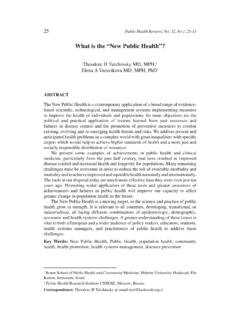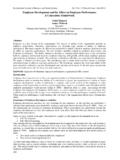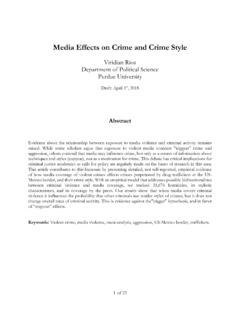Transcription of Ethical Issues Concerning Vaccination Requirements
1 1 Public Health Reviews, Vol. 34, No 1 Ethical Issues Concerning Vaccination RequirementsAlvin Nelson El Amin, MD, MPH,1 Michelle T. Parra, PhD,1 Robert Kim-Farley, MD, MPH,1 Jonathan E. Fielding, MD, MPH1 ABSTRACTV accinations are one of public health s greatest achievements. However, an Ethical dilemma lies in the balance of personal autonomy and choice versus protection of the entire at risk population. Vaccines have become readily available in most parts of the world, yet debates continue as to the appropriateness of Requirements for vaccinations, including legal mandates of vaccinations during public health emergencies and more routinely for school entry.
2 This paper addresses Ethical Issues Concerning Vaccination Requirements in the context of historical as well as current immunization program activities. Five important programmatic focus areas for immunization programs are identified for minimizing conflicts among the relevant Ethical principles when developing and implementing Vaccination Requirements ; namely: 1) reviewing and evaluating current Vaccination mandates in the relevant health jurisdiction; 2) increasing the use of non-compulsory Vaccination strategies; 3) addressing parent/guardian vaccine safety concerns; 4) enhancing public awareness of vaccine-preventable disease risks; and 5) promoting a better public understanding of herd immunity.
3 We suggest that strengthening these programmatic focus areas can lead to a greater public acceptance of Vaccination Words: Immunization, Vaccination , vaccine mandates, personal belief exemptionSuggested Citation: El-Amin AN, Parra MT, Kim-Farley R, Fielding JE. Ethical Issues Concerning Vaccination Requirements . Public Health Reviews. 2012;34: epub ahead of use of vaccines to globally eradicate smallpox and eliminate many of the major vaccine-preventable causes of childhood morbidity and mortality 1 Los Angeles County Department of Public Health, Los Angeles, CA, Author Contact Information: Alvin Nelson El Amin at Los Angeles County Dept of Public Health, 3530 Wilshire Blvd.
4 Suite 700, Las Angeles, CA 90010, Public Health Reviews, Vol. 34, No 1as public health problems in the United States and other developed nations is one of the most important public health achievements of the last In most developed countries, Vaccination has resulted in once common diseases now being rare. Vaccination Requirements , variably designated as compulsory Vaccination laws and vaccine mandates, are important tools for achieving the high Vaccination coverage levels that resulted in this positive impact on population health. The first such Vaccination Requirements were passed in Italy in 1806, France in 1810, and in Sweden in Proposals for Vaccination require-ments often precipitated vigorous discussions of Ethical Issues , especially among parents and guardians of infants and children targeted to receive the vaccines.
5 In the past, these concerns impacted the extent to which Vaccination Requirements were enacted or, when enacted, the extent to which they could be enforced. This paper addresses the major Ethical Issues felt to have been pertinent to Vaccination Requirements , using selected examples over the last 200 years, and provides suggestions on how to minimize Ethical conflicts when developing and implementing Vaccination Requirements in the future. We do not imply that any of the Vaccination Requirements discussed herein were inappropriate or were not supported by the extant evidence base at the time they were implemented. Our focus rather is on the nature and role of Ethical considerations in the implementation of Vaccination Requirements and possible strategies to be considered by immunization programs for gaining positive public response or alternatives to CONSIDERATIONS RELEVANT TO Vaccination REQUIREMENTSThe last decades of the twentieth century witnessed the emergence and consolidation of a set of core Ethical principles felt to be critical to medical research, and the practice of These principles stressed the autonomy of the individual.
6 Not surprising given the paternalistic and authoritarian manner that sometimes characterized modern medicine in the last century. However, because public health is concerned with the health of communities and populations, in addition to the health of individuals, and because governmental authority is crucial to the implementation and sustainability of public health programs, it has become apparent that biomedical Ethical frameworks are not always appropriate for defining and guiding public health Furthermore, many of the actions that are taken to contain infectious disease epidemics or other public health emergencies could be considered paternalistic in Issues Concerning Vaccination Requirements 3 Over the past two decades.
7 Much activity has been directed toward the goal of defining the Ethical principles relevant to public health. There is some consensus, as put forth by Childress et al. in 2002, that the most relevant of these principles (which they label moral considerations) are: 1) producing benefits; 2) avoiding, preventing, and removing harms; 3) producing the maximal balance of benefits over harms and other costs ( , utility); 4) distributing benefits and burdens fairly ( distributive justice ) and ensuring public participation, including the participation of affected parties ( procedural justice ); 5) respecting autonomous choices and actions, including liberty of action; 6) protecting privacy and confidentiality; 7) keeping promises and commitments.
8 8) disclosing information as well as speaking honestly and truthfully ( , transparency); and 9) building and maintaining Childress et al. suggest that three of these moral considerations benefiting others, preventing and removing harms, and utility are critical to the goal of public health while three others justice , respect for autonomy, and privacy are most likely to limit public health In addition to defining the Ethical Issues relevant to public health, we must also acknowledge that there are often instances in the practice of public health decision-making and program implementation where the above noted considerations may come into conflict, provoking a need to choose or assign a greater weight to one of these moral considerations over another.
9 Childress et al. proposed five justificatory conditions to help determine when the moral considerations critical to public health (benefiting others, preventing and removing harms, and utility) can take precedence over the other goals during specific public health These conditions are: effectiveness of the activity, proportionality of the activity (the probable public health benefits outweigh the infringed other moral considerations), necessity of the activity, the extent to which the activity represents the least infringement of the other moral considerations, and lastly, the ability to publicly justify the activity in a transparent manner.
10 Because Vaccination activities are a key component of many public health programs, we suggest that they fall within this Ethical framework. Diekema and Marcuse, however, have put forth a more direct approach for evaluating and resolving Ethical Issues around mandatory Vaccination Their approach is based upon the often cited medical maxim commonly translated as: first, do no harm. When applied to Vaccination activities, this maxim has the following implications: the Vaccination should be of benefit to the subject being vaccinated; care should be taken to prevent any harm that might accrue from the Vaccination ; compared to other procedures for addressing the same issue, the Vaccination should be 4 Public Health Reviews, Vol.




